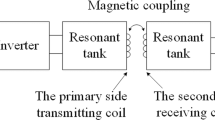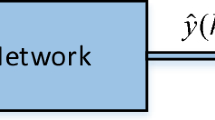Abstract
This paper investigates the incipient fault diagnosis problem of the multiple-output wireless power transfer system (MWPTS). And the MWPTS described in this paper has nonlinearity and high-order characteristics. Firstly, based on the Kirchhoff theorem and the interconnect system modeling method, a more realistic dynamics model of MWPTS with incipient faults, parameter uncertainty, and time delay is established. The proposed modeling method dramatically reduces the order of MWPTS. Then, a novel observer-based control strategy is proposed to estimate incipient faults while keeping the system stable even if MWPTS are affected by time delay and parameter uncertainty. Finally, the simulation result verified the availability of the incipient fault-tolerant method.
Similar content being viewed by others

References
X. Dai, J. Wu, J. Jiang, R. Gao, and U. K. Madawala, “An energy injection method to improve power transfer capability of bi-directional WPT system with multiple pickups,” IEEE Transactions on Power Electronics, vol. 36, no. 5, pp. 5095–5107, 2021.
Z. M. Yu, Y. Sun, X. Dai, and X. J. Su, “Decentralized time-delay control using partial variables with measurable states for a class of interconnected systems with time delays,” IEEE Transactions on Cybernetics, vol. 52, no. 10, pp 10882–10894, 2022.
Y. S. Fan, Y. Sun, X. Dai, Z. P. Zuo, and A. H. You, “Simultaneous wireless power transfer and full-duplex communication with a single coupling interface,” IEEE Transactions on Power Electronics, vol. 36, no. 6, pp. 6313–6322, 2021.
Y. F. Chen, H. L. Zhang. C. S. Shin, C.-H. Jo, S. J. Park, and D. H. Kim, “An efficiency optimization-based asymmetric tuning method of double-sided LCC compensated WPT system for electric vehicles,” IEEE Transactions on Power Electronics, vol. 35, no. 11, pp. 11475–11487, 2021.
H. Jiang, J. Zhang, and D. Lan, “A low-frequency versatile wireless power transfer technology for biomedical implants,” IEEE Transactions on Biomedical Circuits and Systems, vol. 7, no. 4, pp. 526–535, 2013.
N. Sate, H. Kifune, and S. Komeda, “A coil layout of wireless power transfer systems based on multi-coil arrangement for under-water vehicles,” Electrical Engineering in Japan, vol. 207, pp. 38–48, 2019.
Y. L. Li, Y. Sun, and X. Dai, “Controller design for an uncertain contactless power transfer system,” Information Technology Journal, vol. 11, no. 8, pp. 971–979, 2012.
Y. L. Li, Y. Sun, and X. Dai, “μ-synthesis for frequency uncertainty of the ICPT system,” IEEE Transactions on Industrial Electronics, vol. 60, no. 1, pp. 291–300, 2012.
X. Dai, Y. Zou, and Y. Sun, “Uncertainty modeling and robust control for LCL resonant inductive power transfer system,” Journal of Power Electronics, vol. 13, no. 5, pp. 814–828, 2012.
X. Dai, X. Y. Huang, and Y. Sun, “Study on discrete time mapping modeling and stability analysis for piecewise autonomous oscillation systems,” ACTA Automatica Sinica, vol. 33, no. 1, pp. 72–77, 2007.
Y. G. Su, X. Dai, and Y. Sun, “Precise discrete mapping model for soft switched circuit,” Journal of System Simulation, vol. 21, no. 3, pp. 672–683, 2009.
Z. M. Yu, Y. Sun, X. Dai, and Z. H. Ye, “Stability and control of uncertain ICPT system considering time-varying delay and stochastic disturbance,” International Journal of Robust and Nonlinear Control, vol. 29, pp. 6582–6604, 2019.
Y. N. Wang, L. Dong, X. Z. Liao, X. L. Ju, and F. R. Xiao, “Design of active disturbance rejection control for inductive power transfer systems,” Journal of Power Electronics, vol. 5, pp. 1434–1447, 2018.
R. K. Mai, T. R. Lin, and Y. Li, “Study on small signal modeling and controlling for dual transmitters based inductive power transfer system,” Proceedings of the CSEE, vol. 37, no. 20, pp. 6068–6076, 2017.
X. Dai, X. Y. Huang, and Y. Sun, “Study of frequency jump phenomenon observed in current-fed soft-switched converter,” Transactions of China Electrotechnical Society, vol. 21, no. 6, pp. 78–82, 2006.
Z. M. Yu, Y. Sun, and X. Dai, “Stability and stabilization of the fractional-order power system with time delay,” IEEE Transactions on Circuits and Systems. II, vol. 68, no. 11, pp. 3446–3450, 2021.
D. Zhang, H. L. Xu, H. Wang, and X. F. Chen, “Stability analysis for interconnected system with quantized sampled-data control,” Applied Mathematical Modelling, vol. 102, pp. 313–330, 2022.
M. A. Ahandani, H. Kharrati, F. Hashemzadeh, and M. Baradarannia, “Decentralized switched model-based predictive control for distributed large-scale systems with topology switching,” Nonlinear Analysis: Hybrid Systems, vol. 38, 1000912, 2020.
J. Bhukya and V. Mahajan, “Optimization of controllers parameters for damping local area oscillation to enhance the stability of an interconnected system with wind farm,” International Journal of Electrical Power and Energy Systems, vol. 119, 105877, 2020.
H. Yang, C. K. Huang, B. Jiang, and M. M. Polycarpou, “Fault estimation and accommodation of interconnected systems: A separation principle,” IEEE Transactions on Cybernetics, vol. 49, no. 12, pp. 4103–4116, 2019.
V. Reppa, M. M. Polycarpou, and C. G. Panayiotou, “Distributed sensor fault diagnosis for a network of interconnected cyberphysical systems,” IEEE Transactions on Control of Network Systems, vol. 2, no. 1, pp. 11–23, 2015.
X. Y. Xi, J. F. Zhao, T. Z. Liu, and L. M. Yan, “Distributed-observer-based fault diagnosis and fault-tolerant control for time-varying discrete interconnected systems,” Journal of Ambient Intelligence and Humanized Computing, vol. 11, no. 14, pp. 459–482, 2020.
X. Y. Shen and X. J. Li, “Data-driven output-feedback LQ secure control for unknown cyber-physical systems against sparse actuator attacks,” IEEE Transactions on Systems, Man, and Cybernetics: Systems, vol. 51, no. 9, pp. 5708–5720, 2021.
X. J. Li and X. Y. Shen, “A data-driven attack detection approach for DC servo motor systems based on mixed optimization strategy,” IEEE Transactions on Industrial Informatics, vol. 16, no. 9, pp. 5806–5813, 2020.
T. Saravanakumar, N. H. Muoi, and Q. Zhu, “Finite-time sampled-data control of switched stochastic model with non-deterministic actuator faults and saturation nonlinear-ity,” Journal of the Franklin Institute, vol. 357, no. 18, pp. 13637–13665, 2020.
T. Saravanakumar, V. J. Nirmala, R. Raja, J. D. Cao, and G. P. Lu, “Finite-time reliable dissipative control of neutraltype switched artificial neural networks with non-linear fault inputs and randomly occurring uncertainties,” Asian Journal of Control, vol. 22, pp. 2487–2499, 2020.
T. Saravanakumar, S. M. Anthoni, and Q. Zhu, “Resilient extended dissipative control for Markovian jump systems with partially known transition probabilities under actuator saturation,” Journal of the Franklin Institute, vol. 357, no. 10, pp. 6197–6227, 2020.
Q. Zhong, S. Han, K. Shi, S. Zhong, and O. M. Kwon, “Co-design of adaptive memory event-triggered mechanism and aperiodic intermittent controller for nonlinear networked control systems,” IEEE Transactions on Circuits and Systems II: Express Briefs, vol. 69no. 12, pp. 4979–4983, 2022.
K. Shi, X. Cai, K. She, S. Zhong, Y. Soh, and O. Kwon, “Quantized memory proportional-integral control of active power sharing and frequency regulation in island microgrid under abnormal cyber attacks,” Applied Energy, vol. 322, 119540, 2022.
B. Zhu, Q Zong, Y. Chen, S. Liao, Z. Li, K. Shi, and M. A. Sotelo, “A novel reconstruction method for temperature distribution measurement based on ultrasonic tomography,” IEEE Transactions on Ultrasonics, Ferroelectrics, and Frequency Control, vol. 69, no. 7, pp. 2352–2370, 2022.
C. Liu, J. Bin, K. Zhang, and R. J. Patton, “Distributed fault-tolerant consensus tracking control of multi-agent systems under fixed and switching topologies,” IEEE Transactions on Circuits and Systems-I: Regular Papers, vol. 68, no. 4, pp. 1646–1658, 2021.
L. H. Xie, “Output feedback H∞ control of systems with parameter uncertainty,” International Journal of Control, vol. 63, no. 4, pp. 741–750, 1996.
S. X. Sun, H. G. Zhang, C. Liu, and Y. Liu, “Dissipativity-based intermittent fault detection and tolerant control for multiple delayed uncertain switched fuzzy stochastic systems with unmeasurable premise variables,” IEEE Transactions on Cybernetics, vol. 52, no. 9, pp. 8766–8780, 2022.
S. X. Sun, H. G. Zhang, J. Zhang, L. F. Yu, and J. Y. Sun, “Multiple delay-dependent robust H∞ finite-time filtering for uncertain Itô stochastic Takagi-Ugeno fuzzy semi-Markovian jump systems with state constraints,” IEEE Transactions on Fuzzy Systems, vol. 30, no. 2, pp. 321–331, 2022.
Y. P. Yi, D. Y. Chen, H. H. Li, C. S. Li, and J. Z. Zhou, “Observer-based adaptive output feedback fault tolerant control for nonliear hydro-turbine governing system with state delay,” Asian Journal of Control, vol. 22, no. 1, pp. 192–203, 2020.
X. X. Hua, D. R. Huang, and S. H. Guo, “Extended state observer based on ADRC of linear system with incipient fault,” International Journal of Control Automation and Systems, vol. 18, pp. 1425–1434, 2020.
A. Dabiri, E. A. Butcher, M. Poursina, and M. Nazari, “Optimal periodic-gain fractional delayed state feedback control for linear fractional periodic time-delayed systems,” IEEE Transactions on Automatic Control, vol. 63, no. 4, pp. 989–1002, 2017.
Author information
Authors and Affiliations
Corresponding author
Ethics declarations
The authors declare that there is no competing financial interest or personal relationship that could have appeared to influence the work reported in this paper.
Additional information
Publisher’s Note Springer Nature remains neutral with regard to jurisdictional claims in published maps and institutional affiliations.
This work was supported by the National Natural Science Foundation of China under Grants 52277003, 62103066, the China Postdoctoral Science Foundation under Grants 2021TQ0392 and 2021M700592, the Chongqing postdoctoral innovative talents support program CQBX2021005, the Chongqing Postdoctoral Science Foundation under Grant cstc2021jcyj-bshX0178, and National Center for International Research on Wireless Power Transfer Technology.
Xin Dai received his B.S. degree in automatic from Chongqing technology and business University, Chongqing, China, in 2000, and an M.S. degree in control theory and control engineering from Chongqing University, Chongqing, China, in 2003. Then, He received a Ph.D. degree in control theory and control engineering from Chongqing University, Chongqing, China, in 2006. He is currently a professor and associate dean with the College of Automation, Chongqing University, Chongqing, China, 400044. His current research interests include wireless power transmission technology and related support power electronics technology research. He is a Member, IEEE.
Xingxing Hua received her B.S. degree in mathematics and applied mathematics from Chongqing University Of Education, Chongqing, China in 2017, and an M.S. degree in system science from Chongqing Jiaotong University, Chongqing, China, in 2020. Since 2020, she has been a doctoral student with the College of Automation, Chongqing University, Chongqing, China, 400044. Her research interests include fault diagnosis.
Shaoxin Sun received her B.S. degree in control technology and instrument from Hebei University, Baoding, China, in 2014, and an M.S. degree in control theory and control engineering from Northeastern University, Shenyang, China, in 2016. Then, she received the Ph.D. degree in control theory and control engineering from Northeastern University, Shenyang, China, in 2021. She is currently an assistant research fellow with the College of Automation, Chongqing University, Chongqing 400044, China. Her current research interests include fuzzy systems, time-delay systems, fault estimation, fault tolerant control, and stochastic/random systems.
Yue Sun received his B.E. degree in electrical engineering, an M.E. degree in industry automation, and a Ph.D. degree in mechanical electrical integrated manufacturing from Chongqing University, Chongqing, China, in 1982, 1988, and 1995, respectively. In 1997, he was a Senior Visiting Scholar with the University of Valenciennes, Valenciennes, France. He is currently a Professor with the School of Automation, Chongqing University. His current research interests include automatic control, wireless power transfer, and power electronics applications.
Rights and permissions
About this article
Cite this article
Dai, X., Hua, X., Sun, S. et al. Stability Analysis and Incipient Fault Tolerant Control for Multiple-output Wireless Power Transfer Systems. Int. J. Control Autom. Syst. 21, 3957–3969 (2023). https://doi.org/10.1007/s12555-022-0735-y
Received:
Revised:
Accepted:
Published:
Issue Date:
DOI: https://doi.org/10.1007/s12555-022-0735-y



